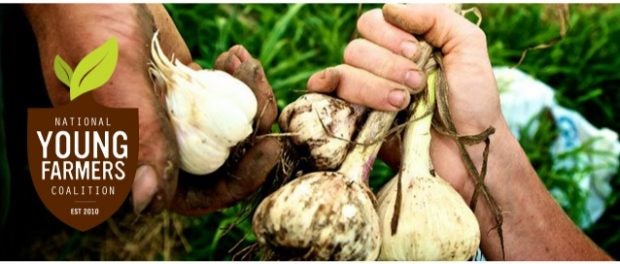Farmland for Farmers Report from NYFC

Farmland for Farmers – Working Farm Easements as a Tool to Keep New York Farmers on the Land
The National Young Farmers Coalition has published a report—“Farmland for Farmers – Working Farm Easements as a Tool to Keep New York Farmers on the Land”—that examines how working farm easements that include farmer ownership and affordability provisions can help address the challenge of land access.
As a growing number of New York farmers prepare to retire and access to affordable farmland persists as the number one challenge confronting young farmers, it is critical that New York State continues to take progressive actions to keep farmland affordable and in production. Today’s report outlines the scope of the problem, shares key statistics, and delivers recommended actions for the State to help address this challenge.
“Traditional conservation easements are not enough to keep New York’s farm economy intact,” says Lindsey Lusher Shute, Executive Director of the National Young Farmers Coalition and co-owner of Hearty Roots Community Farm in Clermont. “By following the recommendations in this report, New York State will ensure that public dollars for farmland protection are supporting multigenerational farmers and will provide opportunity for newcomers. For the sake of regional food security and the state’s agricultural economy, farmland affordability must be a priority for farmland conservation resources.”
The Farmland for Farmers report, which includes results of a survey of land trusts across New York that work on farmland protection, calls on the State to prioritize the use of working farm easements, promote the addition of farmer ownership and affordability provisions to existing easements, and facilitate the sharing of information and best practices among land trusts to support the use of working farm easements.
New York’s 35,500 farms keep over 7 million acres of land in agricultural production, support more than 160,000 jobs, and generate more than $39 billion annually, but rising farmland prices and competition from non-farming buyers are increasingly pushing New York farmland out of farmer ownership—a change that is difficult, if not impossible, to reverse. Over the last twenty years, the majority of counties in New York saw a decline in the number of owner-operated farms. As of 2012, only 53 percent of all farm operators in the state listed farming as their primary occupation.
The State has a strong legacy of combatting these trends—protecting more than 61,000 acres of agricultural land through the FPIG program since 1996. And in recent years, Governor Andrew Cuomo and the New York State Department of Agriculture and Markets have built on this legacy by allocating historic levels of funding—including targeted funds for farmland protection in the Hudson Valley and on dairy farms in the state—and improving project implementation. Recently, New York State has taken two additional steps toward protecting farmland for farmers and thus the future of this economic engine. The Department included preemptive purchase rights as eligible costs in the latest round of funding for the Farmland Protection Implementation Grant Program, and Governor Cuomo signed the Working Farm Protection Act into law, following unanimous approval by the New York Legislature.
This new law makes working farm easements with farmer ownership and affordability provisions a permanent voluntary feature of the State program, opening the door for a long-term vision where working farm easements are the standard best practice in New York farmland protection. New York can build on recent successes and move toward this vision by embracing the recommendations made in today’s Farmland for Farmers report.
The National Young Farmers Coalition (NYFC) is a national advocacy network of young farmers fighting for the future of agriculture. Visit NYFC on the web at www.youngfarmers.org, and on Twitter, Facebook, YouTube and Instagram.
Learn more about farm policy and ag. politics at https://www.beginningfarmers.org/farm-policy-agricultural-politics/






 Your Privacy Choices
Your Privacy Choices
Leave a comment